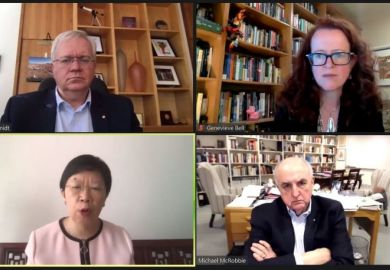Covid-19 will not challenge the dominance of the campus-based model of higher education because its funding and employment structures are “too deeply entrenched”, according to a sector leader.
Katherine Fleming, provost of New York University, told Universities UK’s International Higher Education Forum that “our systems – our faculty review systems, HR systems – are all geared towards a traditional in-person model” of teaching.
At the economic level, “we need student revenue to survive. That’s long been the case in the US, and is now the case in the UK. So, we might think we are ready to move to new models [of teaching online], but if those will change our pricing structures, there will be tremendous resistance within higher education,” Professor Fleming said.
“Shouldn’t universities be behaving differently? Absolutely. But I don’t think that they will, because higher education itself is so deeply entrenched in these substructures,” Professor Fleming said.
It was “one of the paradoxes” of higher education that academics saw themselves as being at the cutting edge when it came to research, yet existed within rigid structures such as tenure and peer review, Professor Fleming said. She added: “It means we are all complicit in maintaining the status quo as much as we possibly can.”
Fundamentally, the reason that higher education “has not changed, nor will it change” was that it was run by “people like me…people who are middle-aged…[who] are expected to have had a certain level of education”, including a decades-old PhD, she said.
Professor Fleming said there was already evidence that little had changed, as NYU had already had more than 100,000 applications this year, “an all-time high”.
“The surge in applications is something that elite universities across the board have really seen and clearly connects to the fact that there is tremendous demand from students to get back to normal,” she said.
The “elite genre” relied on the fact that students come together in person, over three to four years, get to know one another, engage in co-curricular activities, and that was “not replicable in the internet sphere”, she said. “People are hungry to return to it.”
Lord Willetts, president of the Resolution Foundation and England’s former universities minister, disagreed. He said he believed higher education would “adapt” to a new normal, which would see a significant return to in-person teaching, but with a greater mix of online learning.
Also speaking on the panel, ’Funmi Olonisakin, vice-principal (international) at King’s College London, added that pressure for change would come from students from Africa, Latin America, India and China.
“We know that middle-class parents [in those regions] put up everything they have so that their children can be part of this global and elite structure,” she said. However, “that elite structure is disappointing those students by not creating the kinds of human beings that we need”.
These students wanted a greater focus on social responsibility in their education, with greater efforts to tackle class, gender and racial inequality. “You have a new generation of people that are making demands of higher institutions and leaders. You can no longer say to them [that] it is OK [for them] not to have access to the kind of education that they want,” Professor Olonisakin said.
Register to continue
Why register?
- Registration is free and only takes a moment
- Once registered, you can read 3 articles a month
- Sign up for our newsletter
Subscribe
Or subscribe for unlimited access to:
- Unlimited access to news, views, insights & reviews
- Digital editions
- Digital access to THE’s university and college rankings analysis
Already registered or a current subscriber?








